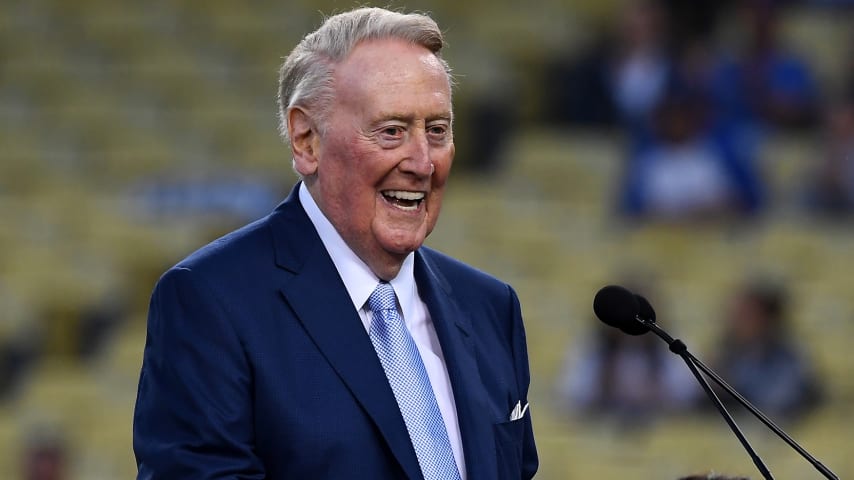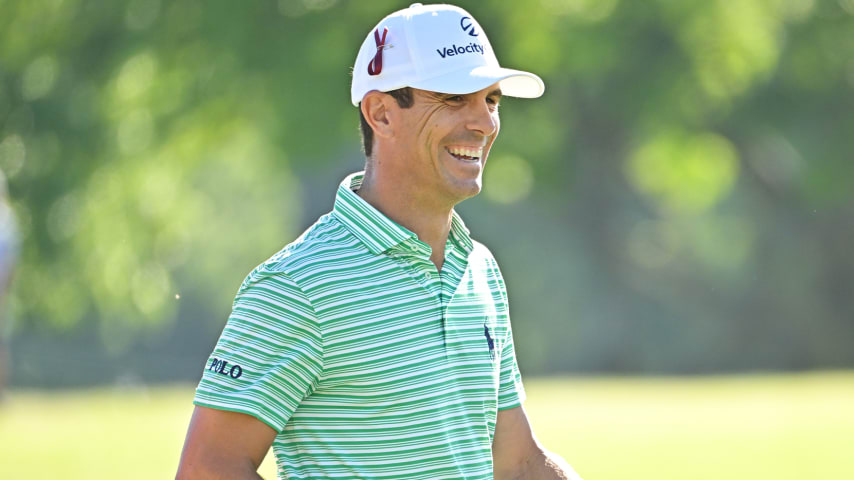Legendary broadcaster Vin Scully passes away at 94
9 Min Read

Longtime Dodgers announcer also lent his voice to golf, including Masters and THE PLAYERS
Written by Laury Livsey
Longtime Dodgers announcer also lent his voice to golf, including Masters and THE PLAYERS

Vin Scully’s best moments calling golf for CBS and NBC
Vin Scully was 8 years old when, in an essay assigned by the nuns at his parochial school, he declared his desire to be a sports broadcaster. He wanted to follow in the footsteps of the men he heard on a nightly basis as he listened to his beloved Brooklyn Dodgers on his family’s large, four-legged radio.
“What a job!” he recalled thinking as he enjoyed his pre-bedtime snack of milk and crackers and enjoyed the southern drawl of Red Barber.
But even a young Scully couldn’t have envisioned what lay ahead, a career that spanned parts of eight decades and had him narrate some of the biggest moments in sports, including 67 years calling games for his beloved Dodgers.
“As far back as I can remember, that’s what I wanted,” Scully said about his career as a broadcaster. “God’s been good.”
Scully went from listening to Barber on the radio to working alongside him. Barber, another legend of the industry, described Scully as “the son I never had,” mentoring him and instilling a professionalism that complemented Scully’s genial tone.
When asked what he learned from Barber in those early years, Scully mentioned two things: “You should have the attitude of a reporter, not a fan. You’re not there to have a good time. You’re there to work, not to clown with guys around the batting cage.
“Above everything else, the people have to believe you. If there’s the slightest doubt about your accuracy and fairness, you aren’t doing it right.”
He brought those characteristics to the booth at Ebbets Field and Chavez Ravine, where he narrated the careers of Sandy Koufax and Clayton Kershaw, but his talents translated across sports. He called 19 no-hitters in his baseball broadcasting career, 14 of those by his Dodgers. But Scully also sat in the press box high above San Francisco’s Candlestick Park and called the 1982 NFC Championship game for CBS that saw Joe Montana connect with Dwight Clark for “The Catch,” a touchdown that led to the San Francisco 49ers’ win over the Dallas Cowboys and a trip to the Niners’ first Super Bowl.
He was one of the announcers for the 1950 World Series, working for the Brooklyn Dodgers at the tender age of 23, still the youngest person to broadcast a World Series game, and he’s remembered nationwide for his call of Bill Buckner’s error and the New York Mets’ ensuing Game 6 rally against the Boston Red Sox in the 1986 World Series. His most famous call may have come on Kirk Gibson’s game-winning home run two years later in the opening game of the 1988 World Series.
“In a year that has been so improbable, the impossible has happened,” Scully declared as an injured Gibson hobbled around the bases, pumping his fist.
Yes, all big events. But right up there with those golden moments in sports history was 1975 in Georgia. Scully was there, too. As a first-year CBS Sports broadcaster, Scully was the network voice of the Masters, a tournament that year featuring a duel between Jack Nicklaus, Johnny Miller and Tom Weiskopf, still considered one of the best and most-important Masters in history.
At the opening of the final-round telecast, which, in those days, was but two hours and showed only the back-nine action, Scully proclaimed, “The Augusta National Golf Club has seen some marvelous finishing rounds, and in this fourth and final round of the 1975 Masters might very well be a story that will live for many years to come.” Prescient comment.
With Nicklaus finished at 12 under, Miller and Weiskopf, both tied and trailing the Golden Bear by one, had the 18th hole to still negotiate. Miller hit his approach shot right of the pin, to 15 feet. Weiskopf went next, knocking his pitching-wedge approach shot to 8 feet above the hole. “And he’s inside Miller. Oh, what a horse race,” Scully exclaimed.
When Miller missed his putt, what Scully called a “gallant effort,” he also added, “and one birdie flew away.” It was then Weiskopf’s turn, “one last shot in the arsenal.” Weiskopf didn’t make his putt, leaving Nicklaus to put on his fifth green jacket. The only voice viewers heard in those final, exciting minutes was Scully’s. No analyst sat next to him. And for much of that late-afternoon drama, the announcer stayed silent, letting the pictures tell the story. It was a hallmark of Scully’s understated style that was fitting for a man known for his humility and grace. He passed away Aug. 2 at the age of 94.
Scully will most certainly always be inexorably tied to baseball due to his decades broadcasting Dodger baseball as well as network games. But sometimes lost in a career that earned Scully a star on the Hollywood Walk of Fame and the Presidential Medal of Freedom, among a myriad of other honors, was his work in the golf broadcast booth, usually near the 18th holes at some of golf’s most-important tournaments. He worked for both CBS and NBC, calling the Masters as well as the first PLAYERS Championship at TPC Sawgrass.
Despite his legendary status, even in 1975, Scully was still an unknown to Augusta National Chairman Clifford Roberts, who asked, “Who is this baseball guy?” when he found out who CBS had hired to do Masters play-by-play. Roberts soon found out.
Scully skipped the 1976 Masters due to baseball commitments but handled play-by-play duty from Augusta National through the 1982 tournament when he left CBS Sports due to his desire to call national baseball. He joined NBC Sports mainly because it held Major League Baseball rights and showed its Saturday baseball “Game of the Week.” While baseball was the draw, Scully began calling PGA TOUR golf in early 1983. His first assignment was the 1983 Bob Hope Desert Classic, followed by the Hawaiian Open at Honolulu’s Waialae Country Club a week later. In the final round at Waialae, Japan’s Isao Aoki holed out from the fairway to immediately end the tournament as Aoki defeated Jack Renner, who was sitting in the scoring tent when Aoki’s shot went in. Scully, watching the shot land on the green and go in the hole, immediately left his mark with a classic comment, referencing nearby Diamond Head, “Jack Renner thought he had a handful of diamonds, but they turned into calcite.”
Throughout his career, Scully worked with legendary golf broadcasting figures, including CBS’s Pat Summerall, Jack Whitaker, Ben Wright and Ken Venturi, all under the direction of Frank Chirkinian. When CBS signed a deal with the PGA TOUR to take on a larger role in televised golf after ABC Sports allowed its contract to expire, Scully expanded his golf repertoire beyond the fairways of Augusta National. It was in 1979 that Scully first traveled to what was then a sleepy seaside enclave of Ponte Vedra Beach outside of Jacksonville, Florida, to broadcast the Tournament Players Championship from Sawgrass Country Club, just a four-hour drive from Vero Beach, the spring training home of the Dodgers.
He continued to make his way to North Florida every March, even after the tournament moved across the street to the newly built TPC Sawgrass. He was in the 18th-hole tower when Jerry Pate in 1982 hit his 5-iron approach shot to the closing hole to three feet and rolled in the birdie putt for the victory. Scully then watched what he called “perhaps the wildest moment in the history of sports” as Pate tossed then-PGA TOUR Commissioner Deane Beman into the lake adjacent to the 18th hole, pushed course designer Pete Dye in after him and then dove in the water himself.
“I was a great admirer of Vin and his career. At CBS, he broadcast the network’s most-important events, and A No. 1 was the NFL. When he started broadcasting golf, it was a real positive for the PGA TOUR because somebody of his stature did not do minor events,” recalled Beman. “At that time, we were still a minor sport. I think it was a very subtle message to the public that when Vin Scully started doing golf that golf was more important than they realized. I think Vin probably saw in the future that golf had the opportunity to become a major sport. It took a while, but that’s what it became. I don’t think Vin would have taken golf under his wing if he didn’t think golf was worthy of somebody of his stature describing the action.”
Scully broadcast nine PLAYERS Championships for CBS then took a two-year hiatus when NBC assumed the tournament’s telecast rights. Scully returned to TPC Sawgrass in 1990 when he took a job with NBC. That first year, Scully teamed with Lee Trevino, a future World Golf Hall of Fame member, who had left competitive golf to move into broadcasting. Scully also worked alongside Bob Costas and Bob Goalby, among others. In addition to his regular schedule of official PGA TOUR events, Scully was also closely associated with and the voice of the popular Skins Game. He first worked the annual Thanksgiving weekend exhibition in 1986 from PGA West in Palm Springs, a tournament featuring Trevino, Nicklaus, Fuzzy Zoeller and Arnold Palmer.
Scully left NBC Sports in 1990 when his old employer, CBS, secured the MLB contract. Although he had two years remaining on his NBC deal, the network asking him to stay and work its 14 scheduled PGA TOUR tournaments, Scully declined, citing the time away from home and wanting only to travel with the Dodgers. That same year, Trevino left NBC to join what was then known as the Senior PGA Tour. Scully’s golf-broadcasting year essentially ended but a legacy of greatness left behind.
Scully also was a passionate player, describing in a 2020 Forbes article the pangs he felt when his golf clubs were among the items sold at auction. “I did have a twinge that there goes a major portion of my life, because I played with my wife, Sandi, at home and all over the world and we had a wonderful time,” he said. He counted three aces and an eagle at Bel-Air’s second hole as the highlights of his time on the career.
“I would never consider myself a good golfer,” Scully said, “just an extremely lucky one.”
It was that same grace and gratitude that made him a legend.











